Difference Between Depression and Anger: Causes, Symptoms, and Management
Depression and anger are two powerful emotions that many people experience, often without realizing how closely they can be connected.
Depression and anger may seem like opposites—one feeling heavy and low, the other fiery and explosive—but they often show up together in surprising ways.
Depression is usually described as deep sadness, hopelessness, or a loss of interest in things you once enjoyed.
Anger, on the other hand, is a strong feeling of frustration or rage, often triggered when you feel hurt, helpless, or treated unfairly. While they seem different, both emotions can come from the same root causes, like unresolved pain, stress, or feeling trapped in difficult situations.
Many people struggling with depression don’t just feel sad—they also feel angry, either at themselves, at others, or at the world.
Understanding how depression and anger can overlap is important for healing. In this guide, we’ll explore how these two emotions are connected, why they sometimes feed off each other, and what steps you can take to manage them both in healthy ways.
What is Depression?
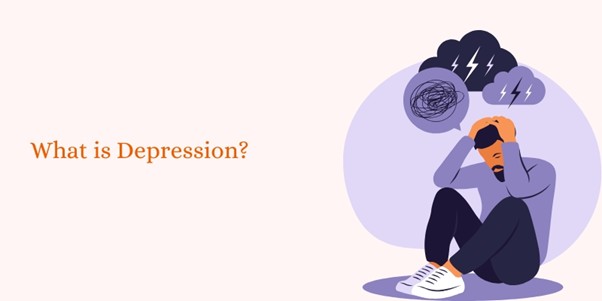
Depression is a mental health condition that affects how you feel, think, and act. It’s more than just feeling sad or having a bad day—it’s a lasting feeling of sadness, emptiness, or hopelessness that doesn’t go away easily.
Common symptoms of depression include:
- Persistent sadness or low mood
- Loss of interest or pleasure in activities once enjoyed
- Changes in appetite (eating too much or too little)
- Sleep problems (insomnia or oversleeping)
- Fatigue or low energy
- Feelings of worthlessness or guilt
- Trouble concentrating or making decisions
- Thoughts of death or suicide
Depression can look different for each person, and not everyone experiences all symptoms.
How Depression Affects Emotional Regulation
When you’re depressed, your ability to manage emotions weakens. Small problems can feel overwhelming. You might get irritated easily, have a short temper, or struggle to calm yourself down after getting upset.
Instead of processing emotions like anger or frustration in a healthy way, depression can cause you to bottle them up—or let them explode—making emotional swings harder to control.
Over time, this creates a cycle where depression feeds anger, and anger feeds depression, making both harder to manage without support.
What is Anger?
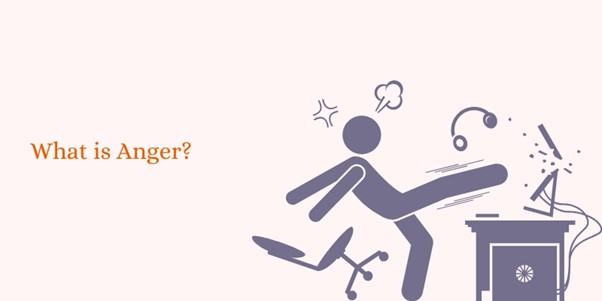
Anger is a natural emotional response to feeling threatened, wronged, frustrated, or powerless. It’s a strong emotion that can range from mild irritation to intense rage. While anger itself isn’t bad, how it’s expressed can either be healthy or harmful.
Types of anger include:
- Passive Anger: Silent treatment, resentment, or indirect behaviors like sarcasm.
- Open Anger: Yelling, arguing, or expressing frustration directly and aggressively.
- Chronic Anger: Long-lasting resentment toward situations, people, or life in general.
- Self-Directed Anger: Blaming and punishing yourself, often linked to guilt or shame.
Everyone experiences anger differently, and it’s important to recognize the type you tend to express.
How Anger Manifests in Behavior and Thought Patterns
Anger can show up in behavior as shouting, slamming doors, giving the cold shoulder, or even physical violence. Some people shut down emotionally, while others lash out impulsively.
In thought patterns, anger often fuels negative thinking, such as:
- Blaming others for problems
- Expecting the worst in situations
- Feeling constantly misunderstood or attacked
- Believing things “should” be fair and feeling enraged when they’re not
Over time, if anger isn’t managed, these patterns can become automatic, making it harder to break the cycle of frustration and negativity.
Depression and Anger: Understanding the Connection
Depression is often linked with deep sadness, but it can also make a person unusually irritable or quick to anger. In fact, about half of people with major depression experience significant irritability alongside their low mood.
This means someone who is depressed might find themselves snapping at loved ones or losing their temper over small frustrations – even if they don’t fully understand why.
Mental health experts note that persistent anger without a clear cause can be a warning sign of depression.
For this reason, clinical definitions of depression have expanded beyond sadness alone. (The American Psychiatric Association’s DSM-5 diagnostic manual doesn’t list anger as a core symptom, but it does acknowledge that many people with depression feel ongoing anger, irritability, and frustration.)
- Irritability means feeling cranky, annoyed, or easily upset. In depression, this might show up as:
- Frequent outbursts or snapping at others over minor issues
- A short fuse – losing patience or temper more quickly than usual
- Constant tension or hostility, even if you try to hide it inside.
These anger-related symptoms can be directed outward toward other people or even inward toward oneself (self-criticism or self-directed anger).
In other words, a depressed individual might be on edge all the time, reacting angrily to things that normally wouldn’t bother them. Researchers have documented sudden bursts of intense anger in some depressed patients – sometimes called “anger attacks.”
These are episodes of rage that flare up suddenly, feel out-of-control or out of proportion, and are often followed by guilt or regret. Such anger attacks are fairly common in depression and can negatively impact a person’s relationships and quality of life.
Why Does Depression Trigger Anger?
Depression affects not only mood but also how we process stress and frustrations. When someone is depressed, they often feel hopeless, exhausted, or trapped in their situation.
These feelings can lower a person’s tolerance for everyday stresses. Small problems may feel overwhelming, and since the individual already feels awful inside, an extra annoyance can easily spark anger.
In simple terms, depression often brings a sense of inner pain and frustration – and this can leak out as irritability or anger toward oneself or others. Experts are still studying how and why depression causes anger in some people.
One theory is that underlying frustration and helplessness in depression fuel anger. A depressed person might think, “Nothing is going right; I can’t fix this,” and this hopelessness can turn into irritability at themselves or the world.
Additionally, depression can involve imbalances in brain chemicals that regulate mood and impulse control, possibly making it harder to control angry impulses.
Indeed, co-occurring problems can amplify the effect: for example, if someone has both depression and anxiety, they may be especially prone to tension and irritability.
Similarly, a person who has experienced trauma or abuse might carry unresolved anger inside; when they become depressed, that anger can surface more readily. Certain recent studies highlight how serious the mix of depression and anger can be.
Co-existing depression and irritability have been linked to worse outcomes – such as poorer daily functioning and higher suicide risk.
A 2024 study of over 40,000 U.S. adults found that high irritability was strongly associated with more severe depression and frequent suicidal thoughts.
In other words, when someone with depression also feels a lot of anger or agitation, their depression may be more difficult to treat and more dangerous if left unaddressed.
The irritability itself can strain relationships and create a cycle: the person’s angry outbursts might lead to guilt or problems with loved ones, potentially deepening their depressive feelings.
This makes it especially important to recognize anger and irritability as part of the depression picture, not just as “bad behavior.”
On a positive note, identifying these symptoms can lead to better help – for example, therapists can teach healthy ways to cope with anger while treating the depression itself.
Gender Differences: Do Men and Women Express Depression Differently?
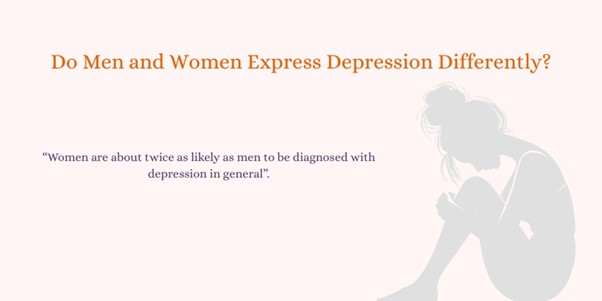
Gender can influence how depression manifests, especially when it comes to anger. Women are about twice as likely as men to be diagnosed with depression in general (in the U.S., roughly 21% of women vs 13% of men experience a major depressive episode in their lifetime).
However, men may be more likely to show anger as a symptom of depression, whereas women might be more likely to appear sad or anxious. In fact, evidence consistently suggests that men tend to experience anger with depression more often.
One analysis noted that in patients with major depressive disorder, men were twice as likely as women to have anger attacks during their depressive episodes.
Men in community samples who score high on depression also report a lot of anger, especially those who strongly identify with “masculine” norms. Why would men show more anger? Psychologists believe social norms and upbringing play a big role.
In many cultures (including the United States), men are often taught to appear tough and not reveal vulnerability. From a young age, boys might hear messages like “don’t cry” or “deal with it,” which encourage them to bottle up feelings of sadness or fear.
As a result, when a man becomes depressed, he might feel that expressing sadness is “weak” or unacceptable. Instead, his pent-up hurt may come out as irritability, anger, or even aggression.
For example, rather than saying “I feel down,” a depressed man might become short-tempered, start fights, or turn to heavy drinking to cope. This doesn’t mean women with depression never get angry – they certainly can.
But it’s thought that anger is a more frequent or noticeable feature of depression in men because of these social conditioning factors. It’s important to highlight this gender difference because it has real impacts on diagnosis and treatment.
Doctors and loved ones might miss depression in men if they only look for sadness and ignore anger and irritability.
Some experts even talk about a “male mask” for depression, where a man’s depression is masked by angry outbursts, risk-taking, or substance abuse instead of the stereotypical crying and withdrawal.
Understanding that a man’s constant irritability, rage, or even risk-taking could be a sign of depression can lead to better help for men who might otherwise slip through the cracks.
On the other side, women with depression might express more sadness, tearfulness, or guilt, which fits the traditional image of depression.
But women are not immune to irritability either – the large 2024 U.S. survey actually found higher overall irritability scores in women than men in the general population. This suggests that while men’s depression-related anger is more often highlighted, many women with depression also feel on edge and short-tempered.
Depression-related anger affects all genders, but men as a group may externalize their pain as anger more frequently, whereas women may be more likely to internalize it as sadness or self-blame.
Age Factors: Depression, Anger, and Different Age Groups
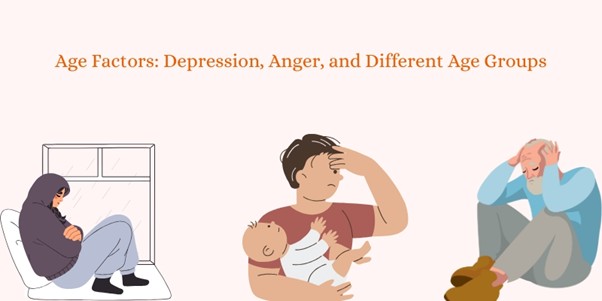
Age can also influence the depression-anger connection. Depression doesn’t look the same in a child, a teenager, a young adult, and a senior – and levels of irritability can vary across these stages of life.
Children and Teenagers
In younger people, depression often shows up more as irritability and crankiness than as overt sadness. It’s normal for adolescents to be a bit moody, but if a child or teen is persistently grouchy, easily angered, or prone to angry outbursts, it could be a sign of depression.
In fact, the mental health diagnostic criteria recognize this: for children and teens, “irritable mood” can substitute for a depressed mood when diagnosing depression. Many depressed teenagers will complain of feeling “annoyed” or get into frequent arguments, rather than saying they feel sad.
For example, a depressed teen might slam doors, yell at family members, or be constantly “on edge.”
Research backs this up – one study found that in depressed youth, over one-third had both depressed mood and irritable mood, and a small percentage showed irritability as the main mood symptom.
This irritability in youth is more than just a phase; children who show chronic irritability are at higher risk of developing mood or anxiety disorders later in life.
In short, for younger people, irritability can be a major red flag for depression and shouldn’t be dismissed as just normal teen angst if it’s severe or long-lasting.
Young and Middle-Aged Adults
In adults, depression frequently includes irritability too. Large U.S. surveys have found that about 40–50% of depressed adults report feeling irritable or grouchy most days.
Interestingly, younger adults seem more prone to depression-related anger than older adults. The National Comorbidity Survey (a nationally representative U.S. survey) reported that irritability in depression was especially common in people aged 18–44.
Similarly, the recent 2024 study noted that younger adults had higher irritability levels on average than older adults.
There could be a few reasons for this trend.
- Younger people (twenties and thirties) might face stresses – like work pressure, family demands, or financial struggles – that make them more irritable when depressed.
- It’s also possible that older adults simply express their depression differently (perhaps more withdrawal or apathy, and less anger), or that some irritable individuals may not reach very old age due to health risks.
Regardless, the takeaway is that if a younger adult is constantly irritable, it may warrant checking in on their mental health, as depression could be an underlying factor.
Older Adults
Depression in seniors can sometimes be overlooked, partly because symptoms might be attributed to aging or physical illness.
When it comes to anger, research has shown that older adults with severe depression can also experience strong feelings of anger, irritability, and hostility.
For example, an older person with depression might appear very grumpy, express unusual bitterness, or be hard to please. One older study in 2011 found that more severe depressive symptoms in the elderly were linked to a higher chance of outward anger and irritability.
However, some older adults may instead show less overt anger and more sadness or cognitive symptoms (like memory problems) when depressed.
Notably, the 2024 U.S. survey observed that when older individuals (65+) do experience high irritability with depression, it correlates strongly with suicidal thoughts – a reminder that anger in a depressed older person is a serious symptom, not just “grumpiness.”
Across all age groups, the presence of anger and irritability in depression is an important clue to what the person is feeling. A child who is lashing out might actually be hurting inside.
A teenager who’s perpetually angry may be masking depression. A middle-aged adult who is irritable and frustrated could be struggling with hopelessness. And an elderly person who is uncharacteristically angry might be going through a late-life depression.
Recognizing these age-related patterns helps caregivers, families, and doctors tailor their support and not dismiss anger as simply a “personality” issue.
Symptoms of Depression-Related Anger
Depression doesn’t always show up as sadness—it can also look like anger, irritability, or frustration. Here are some of the most common signs of anger that are linked to depression:
- Irritability: Feeling constantly annoyed or tense, even over small inconveniences.
- Frustration: Getting upset easily when things don’t go perfectly or according to plan.
- Verbal Outbursts: Yelling, snapping, or using harsh words during everyday conversations.
- Passive-Aggressive Behavior: Giving the silent treatment, using sarcasm, or subtly undermining others.
- Physical Restlessness: Pacing, fidgeting, or feeling like you “can’t sit still” when angry.
- Self-Directed Anger: Blaming yourself harshly for mistakes, feeling intense guilt, or even engaging in self-harming behaviors.
- Social Withdrawal: Avoiding people to prevent conflict, or because interactions feel too overwhelming.
- Low Tolerance for Stress: Feeling immediately overwhelmed by even minor pressures or challenges.
- Rage Attacks: Sudden, intense bursts of anger that feel uncontrollable and are often followed by guilt or exhaustion.
Examples and Case Studies
Example 1:
John, 35, always thought of depression as being sad. But when he became depressed after losing his job, he noticed he was yelling at his kids over small things like spilled milk or leaving toys out.
He didn’t feel “sad”—he felt constantly irritated and ready to explode. It wasn’t until his wife pointed out the pattern that he realized something deeper was going on.
Example 2:
Maria, 22, started feeling extremely frustrated at college. Every little assignment felt like a huge burden, and she found herself snapping at her roommates for minor issues like loud music.
She later sought help and discovered her anger was masking feelings of hopelessness and depression after a tough breakup.
Example 3:
Tom, 58, didn’t realize his late-life depression was causing him to lash out. Friends noticed he had become bitter, grumpy, and impatient. Tom thought he was just “getting old” but therapy revealed unresolved grief and depression were fueling his anger.
Recognizing these signs early can help people seek the right support before anger and depression cause even deeper emotional wounds.
Causes of Depression-Induced Anger: Underlying Factors Behind Depression-Related Anger
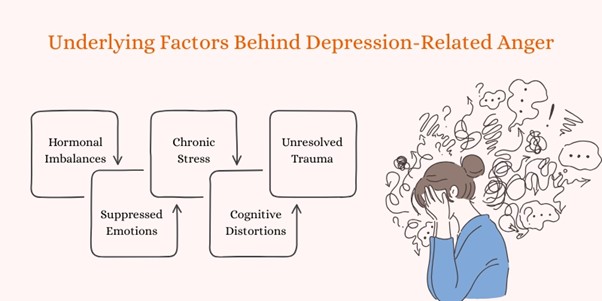
Depression-induced anger often doesn’t come from “nowhere.” Several factors can create the perfect storm where sadness, frustration, and rage blend together. Here’s a breakdown of the most common causes:
1. Hormonal Imbalances
Brain chemicals like serotonin, dopamine, and norepinephrine help regulate mood. When these are out of balance, it’s harder to manage emotions. Low serotonin levels, for example, are linked to both depression and aggression, making it easier to react with anger instead of calmness.
2. Chronic Stress
Long-term stress wears down emotional resilience. When the brain is constantly in “survival mode,” small irritations can feel overwhelming, and anger can become the default reaction to ongoing pressure.
3. Unresolved Trauma
Past emotional wounds—like childhood neglect, abuse, or major life losses—can leave lingering feelings of fear, helplessness, and injustice. When these old hurts aren’t healed, they can surface as anger, especially during depressive episodes.
4. Suppressed Emotions
Some people grow up learning that sadness is “weak” or that they should “tough it out.” Over time, emotions like grief, fear, or disappointment may get pushed down—and resurface as irritation or rage instead.
5. The Role of Cognitive Distortions and Negative Thought Patterns
Depression often fuels cognitive distortions—ways of thinking that twist reality into something more negative or hopeless. These thinking patterns can directly feed anger:
Black-and-White Thinking
Believing situations are either “all good” or “all bad.” If something goes wrong, it feels like a total disaster, sparking frustration and rage.
- Example: “If I’m not perfect, I’m a complete failure.”
Mind Reading
Assuming you know what others are thinking—and it’s usually negative.
- Example: “They’re definitely judging me.”
Catastrophizing
Expecting the worst possible outcome and feeling overwhelmed by fear or helplessness, which can quickly flip into anger.
- Example: “If I mess this up, everything will fall apart.”
Personalization
Believing everything bad is your fault or that others are targeting you.
- Example: “They’re doing this just to upset me.”
When the mind is trapped in these distortions, frustration builds up quickly. Combined with emotional pain, these thoughts make it harder to stay calm, setting the stage for depression-fueled anger.
Depression and Anger: Impact on Daily Life
When depression and anger collide, the effects ripple through every part of life—relationships, work, health, and even a person’s sense of identity.
Let’s look at how this powerful combination can create real challenges:
Relationships
Depression mixed with anger often leads to frequent conflicts, misunderstandings, and emotional distance.
Trust is damaged when someone lashes out repeatedly or withdraws without explanation.
Partners, family members, and friends may feel hurt, fearful, or confused by sudden mood swings.
According to a study published in Frontiers in Psychology (2021), individuals who experience anger with depression report higher levels of relationship strain and lower relationship satisfaction than those without anger symptoms.
Experts note that unresolved anger can cause loved ones to pull away, leaving the depressed person feeling even more isolated—which worsens depression and frustration.
Work and Career
Anger and irritability can damage professional reputations and limit career growth.
Depression-related anger may show up as snapping at coworkers, arguing with supervisors, or missing deadlines due to emotional burnout.
A report by the National Institute of Mental Health (NIMH) highlights that depression is a leading cause of lost work productivity in the U.S., with anger symptoms making it harder to maintain stable employment.
Employees struggling with these emotions are more likely to face job loss, disciplinary actions, or missed promotions because of perceived attitude or behavioral issues, rather than recognized mental health struggles.
Overall Well-Being
The internal toll of depression and anger can be devastating without support.
Chronic anger increases stress hormone levels (like cortisol), leading to higher risks of heart disease, sleep problems, and weakened immune function, according to research from the American Psychological Association (APA).
Individuals caught in the depression-anger cycle often experience lower self-esteem, higher anxiety, and a greater risk of substance abuse as they attempt to numb the pain.
Studies show that people with both depression and frequent anger are also at higher risk for suicidal thoughts, highlighting how urgent it is to address both emotions together.
The combination of depression and anger isn’t just uncomfortable—it can seriously hurt emotional health, relationships, careers, and physical well-being. Early recognition and proper support are crucial to breaking the cycle and building a healthier future.
Anger and Depression: Management and Treatment Strategies (Therapeutic Approaches)
Managing depression-related anger takes a multi-layered approach—addressing both the emotional pain underneath and teaching healthier ways to react.
With the right support, most people can learn to manage these feelings and feel better over time.
Cognitive Behavioral Therapy (CBT)
CBT helps you recognize and change negative thought patterns that fuel anger and depression. Through structured sessions, therapists teach you how to challenge distorted thinking, reframe situations, and develop better coping skills.
Research shows CBT is highly effective for treating both depression and emotional regulation issues.
Dialectical Behavior Therapy (DBT)
Originally developed for people with intense emotions, DBT focuses on managing anger and mood swings through mindfulness, distress tolerance, emotional regulation, and interpersonal effectiveness skills. It’s especially helpful if anger feels explosive or hard to control.
Medication and Lifestyle Changes
Medication
Antidepressants (like SSRIs) can help balance brain chemicals that regulate mood and impulse control.
For some, medication reduces emotional intensity, making it easier to apply coping strategies. Always consult a psychiatrist to find the right fit.
Lifestyle Changes:
- Regular exercise (boosts serotonin and reduces tension)
- Healthy sleep routines (improves mood stability)
- Nutritious eating habits (balances energy and brain health)
- Reducing alcohol or drug use (lowers irritability and emotional reactivity)
Support Systems
Having a strong network of friends, family, or support groups can make a huge difference. Talking openly with trusted people reduces isolation and builds emotional resilience.
Practical Tips for Managing Anger and Depressive Symptoms
- Pause before reacting: Take a few deep breaths or step away when anger rises.
- Use grounding techniques: Focus on your senses (5 things you can see, 4 you can touch, etc.) to stay present.
- Challenge negative thoughts: Ask yourself if there’s another way to view the situation.
- Journal regularly: Writing down feelings can help you process anger safely.
- Practice mindfulness: Spend a few minutes each day focusing on your breath or body sensations to train calmness.
- Set small goals: Break tasks into manageable steps to avoid overwhelm and frustration.
Managing depression and anger isn’t about “getting rid” of emotions—it’s about learning new ways to understand, express, and work through them. With the right tools, healing is not only possible—it’s within reach.
When to Seek Professional Help
While self-help strategies can be very effective for managing mild anger and depression, there are times when professional intervention is necessary.
Ignoring severe symptoms can make the situation worse over time, putting your emotional health, relationships, and safety at risk. Here’s how to know when it’s time to seek help.
Warning Signs You Shouldn’t Ignore
- Persistent anger or irritability that doesn’t improve, even after trying coping strategies
- Frequent outbursts that damage relationships at home, work, or in social settings
- Feelings of hopelessness or overwhelming guilt that make it hard to function
- Thoughts of harming yourself or others
- Loss of interest in things you once cared about, combined with intense frustration
- Substance abuse (like heavy drinking or drug use) as a way to cope with anger or sadness
- Physical symptoms like chronic pain, fatigue, or digestive problems that worsen emotional struggles
If you recognize these signs, it’s important to get professional support. Early intervention often leads to better outcomes.
Resources for Finding Mental Health Professionals
Psychology Today’s Therapist Finder
- Find a therapist based on location, specialty, and insurance.
National Alliance on Mental Illness (NAMI) Helpline
- Call 1-800-950-NAMI (6264) or visit NAMI for support and referrals.
SAMHSA Treatment Locator
- Use findtreatment.gov to locate mental health services near you.
- Book confidential sessions with trained therapists who specialize in depression, anger management, and emotional regulation.
Reaching out for help is not a sign of weakness—it’s a powerful step toward healing, growth, and lasting emotional strength.
Frequently Asked Questions
Can depression cause anger issues?
Yes, depression can cause anger issues. Many people with depression experience irritability, frustration, or sudden outbursts along with sadness.
How can I tell if my anger is related to depression?
If your anger comes with feelings of sadness, hopelessness, guilt, or a loss of interest in things you once enjoyed, it could be linked to depression.
What treatments are effective for managing both depression and anger?
Cognitive Behavioral Therapy (CBT), Dialectical Behavior Therapy (DBT), medication, lifestyle changes, and strong support systems are all effective ways to treat both depression and anger.
Does depression make you angry?
Yes, depression can make you angry. Emotional pain, hopelessness, and low tolerance for stress often surface as irritability or rage in many people with depression.
Is anger a sign of depression?
Anger can be a sign of depression, especially when it’s persistent, intense, or accompanied by other symptoms like sadness, fatigue, or withdrawal.
Conclusion
Depression and anger are more closely connected than many people realize. While it’s normal to feel angry from time to time, persistent irritability, frustration, and outbursts can be signs of something deeper, like depression and anger working together.
Left unchecked, this emotional mix can affect your health, relationships, and overall happiness.
The good news is that help is available—and healing is possible. Whether through therapy, medication, lifestyle changes, or daily coping strategies, you can learn to manage both depression and anger in healthier, more empowering ways.
Recognizing the signs early and taking action are crucial steps toward protecting your well-being.
If you or someone you care about is struggling, don’t wait for things to get worse. Seeking support is a strong, courageous decision that leads to real change.
Remember: you are not alone, and every step you take toward understanding your emotions is a step toward a stronger, healthier life.


3 Responses